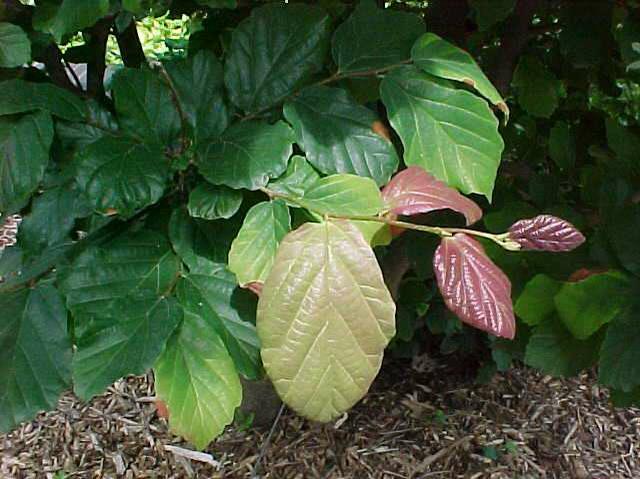Persian ironwood (Parrotia persica)
Persian ironwood
Parrotia persica, commonly called Persian ironwood, is a small to medium sized, single trunk, deciduous tree eventually growing 20-40′ tall (but typically 10′ after 7-8 years) or a large, multi-stemmed shrub growing to 15′ tall. Apetalous flowers with dense, red stamens surrounded by brownish bracts appear in late winter to early spring before the foliage. Flowers are attractive on close inspection, but are generally considered to be somewhat insignificant. Oval to oblong leaves (to 4″ long) emerge reddish-purple in spring, mature to a lustrous, medium to dark green in summer and change to variable shades of yellow, orange and red in fall. Bark of mature trees exfoliates to show green, white or tan patches beneath and provides good winter interest.
Genus name honors F. W. Parrot (1792-184- , German naturalist and traveller who climbed Mount Arart in 183
Specific epithet means Persian.

Best grown in average, slightly acidic, medium moisture, well-drained soils in full sun. Tolerates light shade and a wide range of soil conditions.
| Hardiness zone | 4 - 8 |
| Sun light | Full sun |
| Water | Medium |
| Maintenance | Medium |
No serious insect or disease problems.
Excellent small lawn tree or street tree. Can be incorporated into foundation plantings, particularly in shrub form.
| Common name | Persian ironwood |
| Botanical name | Parrotia persica |
| Plant type | Tree |
| Family | Hamamelidaceae |
| Hardiness zone | 4 - 8 |
| Water | Medium |
| Maintenance | Medium |
| Flower color | Red |
| Flowering period | March - April |
| Height | 20 - 40 ft. |
| Width | 20 - 30 ft. |